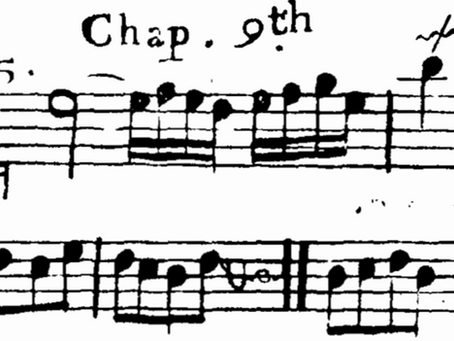top of page
Reimagining Historical Voices
Search


Georg Falck on the use of Extemporised Florid Ornaments and Trills in an Ensemble Setting (1688)
‘Although they are set only in the system of the cantus, these examples of accentus and variation of intervals can be used in the other...

Tim Braithwaite


Two Comments on Ensemble Singing by Joan Albert Ban (1642)
III. Diminution Diminution occurs when larger notes are broken into many parts by the smaller ones in motion. The which must not...

Tim Braithwaite


Pierre-Louis Pollio on the ‘Charivary’ of Improvising (‘Chant sur le Livre’) in Many Parts (1771)
‘As for singing on the book in many parts made impromptu, my sentiment is that it is almost impossible to do well… I maintain that it is...

Tim Braithwaite


Gioseffo Zarlino on Those who Improvise Counterpoint with ‘No Regard for the Other Voices’ (1558)
‘What Must be Observed when Improvising a Third Part on Two Given Parts: Skilled contrapuntists occasionally want to improvise a third...

Tim Braithwaite


Bottrigari on both Ensemble Ornamentation and ‘Odious’ (‘odiosa’) Improvised Counterpoint (1594)
‘[Alemanno Benelli:] But because of the presumptuous audacity of performers who try to invent passaggi, I will not say sometimes, but...

Tim Braithwaite


Conrad von Zabern on those who Deviate from Notated Plainchant Melodies (1474):
‘To sing with fidelity... is to sing so that anyone of those singing together should remain in the form of those notes that were...

Tim Braithwaite


Thomas Morley on the Perils of Many Singers ‘Singing on a Plainsong.’
'As for singing upon a plainsong, it has been in times past in England, as every man knows, and is at this day in other places, the...

Tim Braithwaite


Jean-Jacques Rousseau’s Definition of Chant sur le Livre:
‘Singing on the book. A Plainchant or counterpoint in four parts, which the musicians compose and sing impromptu on a single [part]:...

Tim Braithwaite


English Psalm Singers ‘Tearing with their Throats one Wretched Stave into an Hundred Notes’: (1708)
‘Then out the People yawl an hundred Parts, Some roar, some whine, some creak like the Wheels of Carts; Such Notes the Gam-ut yet did...

Tim Braithwaite


The Practices of ‘Lascivious’ Church Musicians as Described by Heinrich von Nettesheim (1532)
‘Today, music has such great license in churches that even along with the canon of the mass certain obscene little ditties sometimes have...

Tim Braithwaite


Adrianus Petit Coclico on the Art of Singing as (Supposedly) Taught by Josquin Dez Prez (1552):
‘To teach the art of singing well and elegantly to a boy, I advise first that he choose a teacher who sings pleasantly and sweetly with a...

Tim Braithwaite


Johann Samuel Petri’s Advice for Teaching a Congregation to Harmonise a Chorale Extempore (1767)
Question. How can one remedy the fault that a choir, when it sings a well-known church chorale without sheet music, as must often happen,...

Tim Braithwaite


Giovanni Battista Martini on Singing ‘all’improvviso’ on a Cantus Firmus (1774):
'Among the compositions made above a cantus firmus by the masters of the art, those [made] above introits are unique, and are used...

Tim Braithwaite


Banchieri on Writing an Introit that Creates the Effect of Improvised Counterpoint in Many Voices
‘I have no doubt at all that the counterpoints above a cantus firmus from the introits by Constanzo Porta and Giovanni Matteo Asola,...

Tim Braithwaite


Thomas Morley Describing a Hypothetical Competition in Improvised Singing (1597)
‘When I learned descant [1] from my master Bold he, seeing me so inclined and willing to learn, always had me in his company, and because...

Tim Braithwaite


Reminiscences of a Cacophonous (!) way of ‘Singing on the Book’ in Early 19th-Century France
‘I know of no musician today who has any idea what it means to sing on the book. It was an improvised and simultaneous melody [chant]...

Tim Braithwaite


Summary of the Rules of Singing on the Book: Those of “strict counterpoint” in two voices
The summary below is from Jean-Paul Montagnier, “Le Chant Sur Le Livre Au XVIIIe Siècle: Les Traités de Louis-Joseph Marchand et Henry...

Tim Braithwaite


Improvising on a Plainchant (Chanter sur le Livre) as described in Early Nineteenth-Century France
‘... France, where musical taste has always been somewhat backwards, has never abandoned the mania for improvising on plainchant. The...

Tim Braithwaite


Tosi on the Excesses of Modern (1723) Singers, and the Patience of the Waiting Orchestra
Ԥ 5. Every Air has (at least) three Cadences, that are all three final. Generally speaking, the Study of the Singers of the present...

Tim Braithwaite


Do Tosi and his commentators prefer too many or too few ornaments?
I was recently flicking through an instruction book aimed at teaching modern singers how to ornament eighteenth-century repertoire, and I...

Tim Braithwaite
bottom of page
